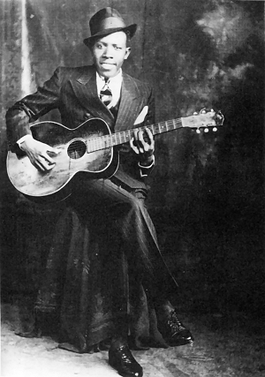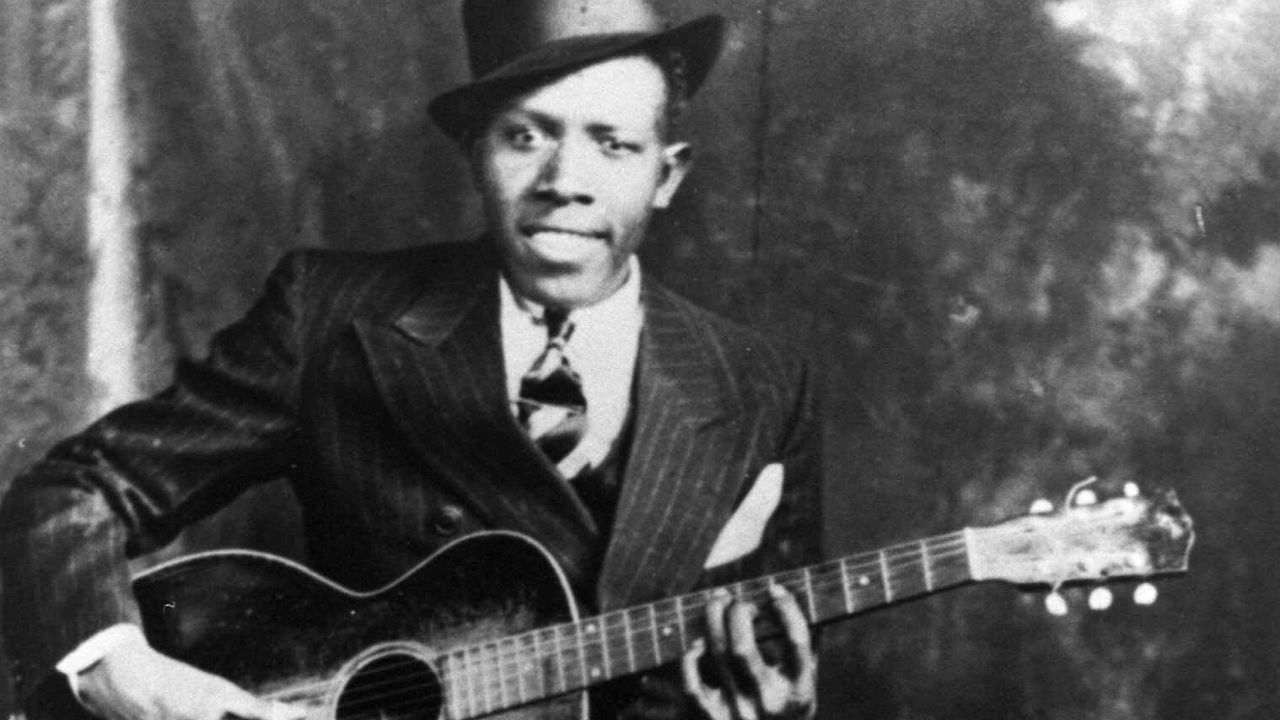Introduction
Robert Johnson, the “King of the Delta Blues,” was an American blues musician whose life and work have become legendary. Born in Mississippi in 1911, his profound influence on generations of musicians is undeniable, with icons like the Rolling Stones, Bob Dylan, and Eric Clapton citing him as a major inspiration. Despite a recording career that spanned a mere seven months, Johnson’s 29 songs have left an indelible mark on the landscape of American music. His innovative guitar techniques, haunting vocals, and poetic lyrics transformed the blues from a regional folk tradition into a genre with global reach. The mystery surrounding his life and untimely death at the age of 27 has only amplified his mythic status, including the persistent legend that he sold his soul to the devil in exchange for his musical talent.

Childhood
Robert Leroy Johnson was born on May 8, 1911, in Hazlehurst, Mississippi, to Julia Major Dodds and Noah Johnson. His mother was married to Charles Dodds, a prosperous landowner with whom she had ten children, but a dispute with white landowners forced Charles to flee Hazlehurst. Julia left with baby Robert, and for a time, he lived in Memphis with his mother and her husband, who had changed his name to Charles Spencer. During these years in Memphis, Johnson attended school and was first exposed to music.
Around 1919, Robert rejoined his mother, who had since married a sharecropper named Dusty Willis. Growing up in the poverty of the Mississippi Delta, Johnson was exposed to the harsh realities that would later permeate his music. Though he was expected to work in the fields, his passion for music was already evident. After learning about his biological father, he adopted the surname Johnson.
Youth
As a young man, Johnson’s desire to become a great blues musician was all-consuming. He initially played the harmonica with some skill, but his early attempts at the guitar were reportedly unimpressive. Blues pioneer Son House recalled that the noise Johnson made with the instrument was enough to drive people away.
In February 1929, at the age of 18, Johnson married sixteen-year-old Virginia Travis, who tragically died in childbirth a year later. This personal tragedy seemed to deepen his commitment to the blues. He later married Caletta Craft in 1931, but she also passed away in early 1933. It was during this period that Johnson disappeared for some time. When he resurfaced, he possessed a mastery of the guitar that astonished his contemporaries, including Son House. This dramatic transformation fueled the enduring legend that he had made a pact with the devil at a crossroads to achieve his newfound virtuosity.
Adulthood
From 1932 until his death in 1938, Robert Johnson lived the life of an itinerant musician. He traveled constantly, playing on street corners, in juke joints, and at Saturday night dances across the Mississippi Delta and beyond. He journeyed with fellow musicians like Johnny Shines to cities such as Chicago, New York, and even into Canada. Johnson had a remarkable ability to connect with his audiences and establish relationships in the communities he passed through.
Despite his later fame, Johnson achieved little commercial success during his lifetime. His entire recorded legacy consists of 29 songs captured during two recording sessions in 1936 and 1937, produced by Don Law in San Antonio and Dallas. These recordings, released as 78 rpm singles, had a small but influential following. One of his first releases, “Terraplane Blues,” sold as many as 10,000 copies, a moderate regional success.
Major Compositions
Robert Johnson’s 29 recorded songs are considered foundational to the blues and rock and roll genres. His compositions are celebrated for their emotional depth, poetic lyrics, and complex guitar work.
Key songs include:
- “Cross Road Blues”: This song is central to the legend of Johnson selling his soul to the devil and has become a rock standard, famously covered by Cream.
- “Sweet Home Chicago”: An iconic blues standard that has been covered by countless artists.
- “Hellhound on My Trail”: A haunting and dark composition that showcases Johnson’s ability to convey a sense of dread and persecution.
- “Love in Vain”: A poignant song of heartbreak and longing, later covered by The Rolling Stones.
- “I Believe I’ll Dust My Broom”: This track features a boogie bass line adapted from piano styles, a revolutionary technique for the guitar at the time.
- “Me and the Devil Blues”: A sinister song where Johnson seems to embrace his rumored pact with the devil.
- “Come On in My Kitchen”: A song that serves as a sensual and spiritual invitation, offering sanctuary from a harsh world.
These songs, among others like “Traveling Riverside Blues” and “Stop Breakin’ Down Blues,” demonstrate his innovative guitar playing and profound lyrical storytelling.
Death
Robert Johnson died on August 16, 1938, at the age of 27, near Greenwood, Mississippi. The circumstances surrounding his death are shrouded in mystery, adding to his legend. The most prevalent theory is that he was poisoned by the jealous husband of a woman with whom he was flirting at a dance at a venue called the Three Forks Club. According to this story, he was given a bottle of whiskey laced with strychnine.
His death certificate lists no official cause of death, as no autopsy was performed. Other theories suggest he may have died from syphilis or Marfan syndrome. His death went largely unnoticed by the public until years later when researchers began to piece together his life story. The location of his grave was also a mystery for decades, with several possible sites identified before a gravestone was erected at what is considered the most reliable location.
Conclusion
Though his life was short and his recording career even shorter, Robert Johnson’s impact on music is immeasurable. He is hailed as a master of the Delta blues and a foundational figure in the development of rock and roll. His music was introduced to a wider audience in 1961 with the release of the album King of the Delta Blues Singers, which influenced a new generation of musicians in the American folk revival and the British blues movement. Artists from Bob Dylan and Keith Richards to Eric Clapton and Jimi Hendrix have cited Johnson as a key influence. His legacy is not just in the songs he wrote and recorded, but in the powerful emotion, technical innovation, and enduring mystery he brought to his craft, solidifying his status as one of the most important musicians of the 20th century.

Comments are closed